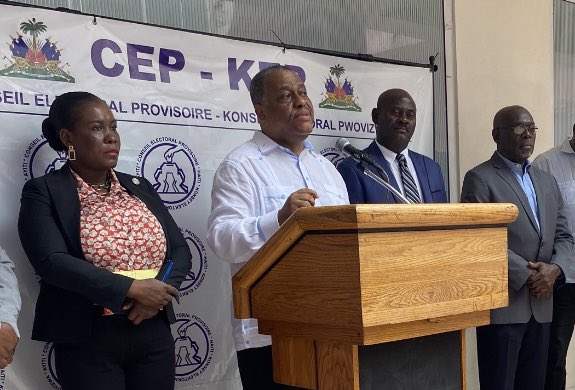Par Patrick Prézeau Stephenson «
While PM Conille visited the Provisional Electoral Council (CEP) this Tuesday, June 18, and Haiti prepares for the 2025 elections, the formation of the Provisional Electoral Council (CEP) presents significant challenges [1]. Haiti’s electoral machine is notoriously rusty, and the institution has lacked electoral advisers for almost three years. With the last elections dating back to 2016, the obstacles to achieving credible and transparent elections in 2025 are numerous and complex [2].
Main Challenges of a Rusty Electoral Machine
1. Establishment of an Electoral Calendar
To organize the 2025 elections, the CEP must first establish a clear and practical electoral calendar. This calendar is the backbone of the entire electoral process, setting deadlines for voter registration, candidate nominations, campaigns and Election Day itself. Without a clear timeline, the process risks becoming chaotic and unmanageable.
2. Security Issues
The current security situation in Haiti poses a major threat to the electoral process. The current director of the CEP, Max Délice, noted the drastic reduction in the number of accessible voting centers due to the security crisis. In addition, restrictions on the movement of people and the lack of necessary equipment further complicate the logistics of organizing elections. The CEP must develop strategies to ensure the security of voters, candidates and election staff in order to maintain the integrity of the election.
3. Updating the Electoral List
Updating the electoral roll is another crucial task. Thousands of voters were displaced or left the country in search of better opportunities. The CEP must take these changes into account to ensure that all eligible voters can participate in the elections. This task is complicated by the need to verify the identity and residence of voters in a context of continued displacement and migration.
4. Legal and Institutional Framework
Max Délice stressed the need to reflect on the legal framework governing elections. The CEP must address legal irritants and ensure that the framework is conducive to fair and transparent elections. This involves working with legal experts, civil society and political parties to identify and correct deficiencies in current laws and regulations.
5. Role of Political Parties and Civil Society
Political parties and civil society are crucial partners in the electoral process. Their commitment and cooperation are essential to ensure that the elections are free, democratic and transparent. The CEP must foster an inclusive dialogue with these stakeholders to build trust and consensus on the way forward.
The Importance of Competent Election Advisors
Délice stressed that the success of the elections depends on the appointment of competent and committed electoral advisers. These advisors must understand the magnitude of the situation and approach electoral issues with seriousness and dedication. The absence of qualified advisors could compromise the credibility and effectiveness of the entire electoral process.
A Critical Perspective:
Ginette Chérubin, distinguished author and former representative of women’s associations at the CEP, offers a unique and critical perspective on Haiti’s electoral challenges in her book ” The Rotten Belly of the Beast« [3]. Chérubin denounces international interference and underlines his resignation from the CEP due to his refusal to endorse questionable electoral results.
His experience highlights systemic problems within Haiti’s electoral system, where external pressures and internal malfeasance undermine the democratic process. Chérubin’s commitment to “doing politics differently”, guided by women’s organizations, reflects a desire for authentic reform and transparency, often out of step with the dominant political culture.
Conclusion: An Electoral Process Under Surveillance
The success of the 2025 elections will largely depend on the CEP’s ability to overcome logistical, security and administrative challenges. The appointment of competent electoral advisers and collaboration with national and international partners will be crucial. In a context of widespread mistrust and multiple crises, the CEP must demonstrate transparency and rigor to restore public confidence and guarantee credible elections.
The coming months will be decisive for the political future of Haiti. The CEP will have the arduous task of restarting a failing electoral machine and leading the country towards elections that could mark a turning point for Haitian democracy. The success of the 2025 elections also relies on the success of the Multinational Security Mission (MMSS) led by Kenya to establish a minimum security climate. The enlightened perspectives of authors like Ginette Chérubin remind us of the principles and values that must guide Haiti’s progress. The road ahead is strewn with pitfalls, but with commitment and effective strategies, it is possible to hope that the CEP will be able to navigate these complexities and hold credible elections in 2025.
References
[1] Tweet from the Prime Minister of the Republic of Haiti, @PrimatureHT. 8:29 PM · Jun 18, 2024. https://twitter.com/PrimatureHT/status/1803223455141118363
[2] https://lenouvelliste.com/article/248642/elections-de-2025-on-na-pas-de-place-pour-les-amateurs-au-cep-soutient-max-delice
[3] Cherubin, Ginette. Rotten belly of the beast (The). Publisher: State University of Haiti; ISBN ZL011501;
Contact Media Patrick Prézeau Stephenson: Editor [email protected]
Similar articles

